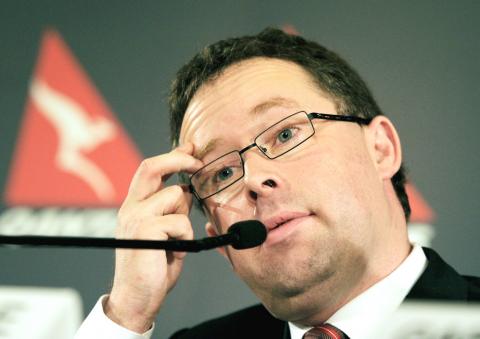The embattled chief of Qantas Airways, Alan Joyce, yesterday said he would forgo any bonus or pay raise, joining a growing list of high-profile top executives at Australian companies who are doing the same.
Qantas is struggling with soaring fuel costs and worsening global conditions and has indicated it will this week post its first annual loss since privatization in 1995.
In a statement to the stock market in June, the airline said it expected underlying profit before tax — its preferred indicator — to be between A$50 million to A$100 million (US$52 million to US$104 million) in the year to June 30

Photo: AFP
This compares with A$552 million in the previous year.
Joyce said the board had accepted his decision to forgo any short-term or long-term incentive payments that would have been awarded for this financial year, and to turn down any salary increase.
“It’s absolutely appropriate that when company returns go down, executive pay should go down as well,” he said in an interview with the Australian Financial Review.
“It has been an extremely tough year for Qantas shareholders and what we want to show is that my pay has to have a huge correlation with the profitability of the company,” Joyce added.
As well as fuel prices, a soaring Australian dollar and a bitter battle with unions over wages and working conditions that saw Joyce ground the entire fleet for 48 hours in October last year have also cost the airline dearly.
According to the newspaper, Joyce’s pay will fall to A$2.3 million for this financial year, compared with the A$5 million he took home the previous year when bonuses and other incentive payments bumped up his salary.
He is following the example of several other high-profile chief executives in bowing to investor pressure on executive remuneration.
The heads of global mining giants BHP Billiton and Rio Tinto, Marius Kloppers and Tom Albanese respectively, have also turned down bonuses.
Elsewhere, banking giants ANZ and Commonwealth have both frozen top executives’ salaries, the newspaper said.

To many, Tatu City on the outskirts of Nairobi looks like a success. The first city entirely built by a private company to be operational in east Africa, with about 25,000 people living and working there, it accounts for about two-thirds of all foreign investment in Kenya. Its low-tax status has attracted more than 100 businesses including Heineken, coffee brand Dormans, and the biggest call-center and cold-chain transport firms in the region. However, to some local politicians, Tatu City has looked more like a target for extortion. A parade of governors have demanded land worth millions of dollars in exchange

Hong Kong authorities ramped up sales of the local dollar as the greenback’s slide threatened the foreign-exchange peg. The Hong Kong Monetary Authority (HKMA) sold a record HK$60.5 billion (US$7.8 billion) of the city’s currency, according to an alert sent on its Bloomberg page yesterday in Asia, after it tested the upper end of its trading band. That added to the HK$56.1 billion of sales versus the greenback since Friday. The rapid intervention signals efforts from the city’s authorities to limit the local currency’s moves within its HK$7.75 to HK$7.85 per US dollar trading band. Heavy sales of the local dollar by

Taiwan Semiconductor Manufacturing Co’s (TSMC, 台積電) revenue jumped 48 percent last month, underscoring how electronics firms scrambled to acquire essential components before global tariffs took effect. The main chipmaker for Apple Inc and Nvidia Corp reported monthly sales of NT$349.6 billion (US$11.6 billion). That compares with the average analysts’ estimate for a 38 percent rise in second-quarter revenue. US President Donald Trump’s trade war is prompting economists to retool GDP forecasts worldwide, casting doubt over the outlook for everything from iPhone demand to computing and datacenter construction. However, TSMC — a barometer for global tech spending given its central role in the

The Financial Supervisory Commission (FSC) yesterday met with some of the nation’s largest insurance companies as a skyrocketing New Taiwan dollar piles pressure on their hundreds of billions of dollars in US bond investments. The commission has asked some life insurance firms, among the biggest Asian holders of US debt, to discuss how the rapidly strengthening NT dollar has impacted their operations, people familiar with the matter said. The meeting took place as the NT dollar jumped as much as 5 percent yesterday, its biggest intraday gain in more than three decades. The local currency surged as exporters rushed to